
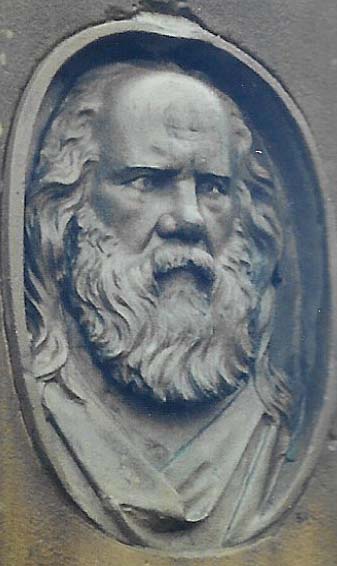 On the monument above Sam Bamford's grave in the Middleton Churchyard the following is inscribed: "Samuel, for promoting
a reform of the Commons House of Parliament and a
repeal of taxes on food, he was twice arrested on
charges of high treason; he was five times taken in
custody before the Privy Council; he was on five
different occasions escorted in chains or manacles to
various and distant parts of the county; he stood a
trial of ten days, and conducted his own defence in a
manner and with a testimony which brought credit to
himself and the cause he represented; not withstanding
which the Jury found him guilty, and he was again sent
to prison."
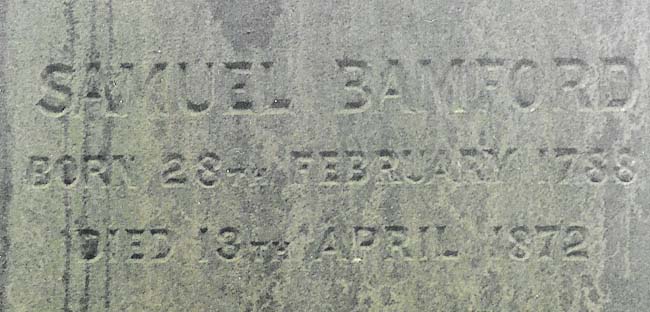
Samuel Bamford was born on the 28th of February, 1788 in Middleton, the son of Hannah and Daniel Bamford. Sam's father was a muslin weaver by trade, but was also known as a part-time school teacher and something of a radical. Daniel Bamford was a disciple of Thomas Paine, the Norfolk Quaker. Paine, encouraged to emigrate to the American Colonies by Benjamin Franklin, was a prominent writer on such issues as slavery and an advocate of American Independence. His book, "The Rights of Man", in which he defended the French Revolution, also argued that poverty, illiteracy, unemployment and war in Europe were the fault of arbitrary government. The book was banned in England. Paine's influence is clear in the drafting the American Declaration of Independence. Daniel Bamford upset the good people of Middleton by abandoning Methodism and setting up his own radical group in the town. It should be no surprise therefore that Samuel went on to take up the cause of universal sufferage and free trade. Sam's working life was undistinguished. Despite the fact that he was educated at the Manchester Grammar Free School and continued later to educate himself by reading Milton, Shakespeare and Burns, he held a succession of rather menial jobs and knew real poverty. In 1812 he married and he and his wife earned a living as weavers. At the same time Sam was writing poetry and publishing books. Indeed Samuel Bamford is often referred to as the Lancashire weaver-poet. In 1816 Bamford became involved with Major John Cartwright, a parliamentary reformer. His goal was to unite middle-class moderates with members of the working-class in the fight for electoral reform. Whilst this might seem to be a fairly innocuous activity today, it landed Cartwright in jail in Huddersfield in 1813. In 1816 Cartwright formed a club, which had as its reason d'etre Parliamentary reform, called the Hampton Club. Samuel Bamford founded a Hampton Club in Middleton that same year. These clubs were viewed with great suspicion by local magistrates and spies were dispatched to infiltrate meetings. Arrests were made and those attending the meetings were charged with sedition. In 1819 the members of the Manchester Hampton Club formed what they termed the "Patriotic Union Society" and that Society invited Cartwright, Henry Hunt, and Richard Carlile to speak at an outdoor rally to be held on St. Peter's Field in Manchester on August 16, 1819. In the end Cartwright did not attend the meeting, but Hunt and Carlile accepted the invitation. Sam Bamford headed a large contingent who walked into Manchester from Middleton to attend this exciting event on a summer's day. " those who went from the mills and the workshop, the hills and the valleys around Manchester, walking in procession, with bugles playing and gay banners flying, though they might look haggard, pinched and careworn, made no attempt to look deplorable or excite compassion." However, as we know, Hunt had no opportunity to speak before, "Hussars, infantry, yeomanry rushed on the defenceless people" in what has gone down in history as the bloody Peterloo Massacre. Hunt and Bamford were both arrested and charged with "assembling with unlawful banners at an unlawful meeting for the purpose of inciting discontent." Hunt served two years and six months in the Ilchester Goal and Bamford spent a year in Lincoln Prison. To a great extent
this ended Bamford's political activism, but he
continued to write. In 1843 he published an
autobiographical work entitled "Passage in the
Life of a Radical". Sam Bamford died on April
13th, 1872, at the age of 85. Bamford has
been variously described as a weaver, poet,
balladeer, historian, romantic, journalist,
beer retailer and diarist. John Bright said
of him, "Bamford was a Reformer when to be
so was unsafe and he suffered for his
faith."
At the age of 70 Bamford write his last poem entitled "Farewell to my Cottage". The first verse ends:
Bamford's memorial in
Middleton Cemetery.
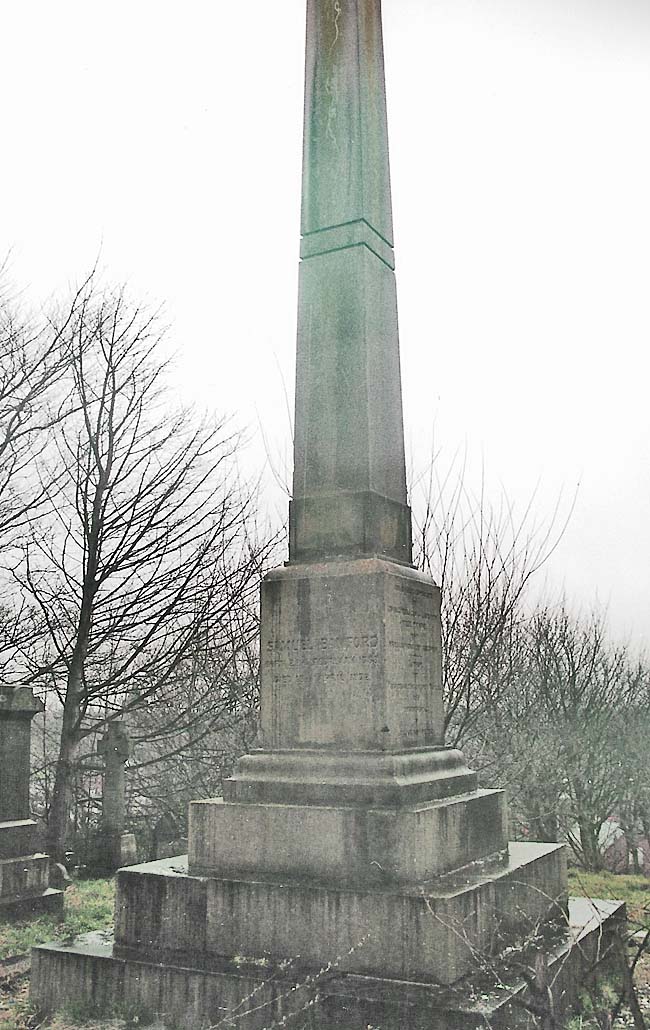 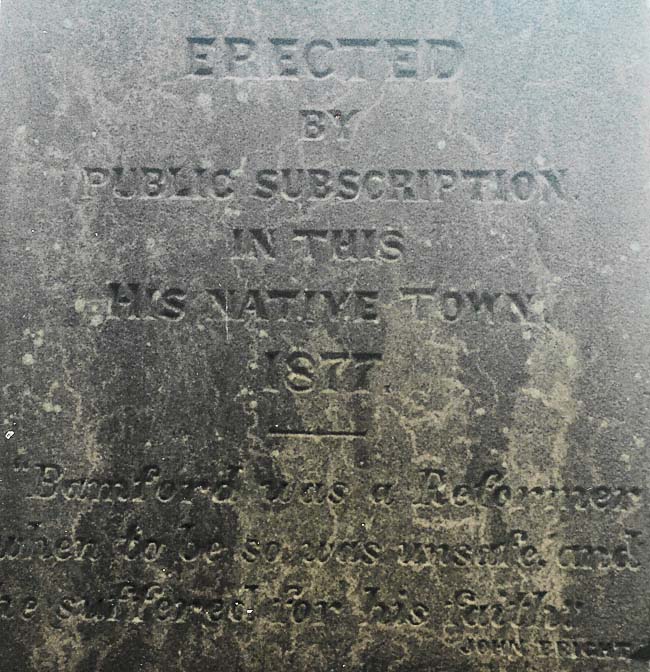 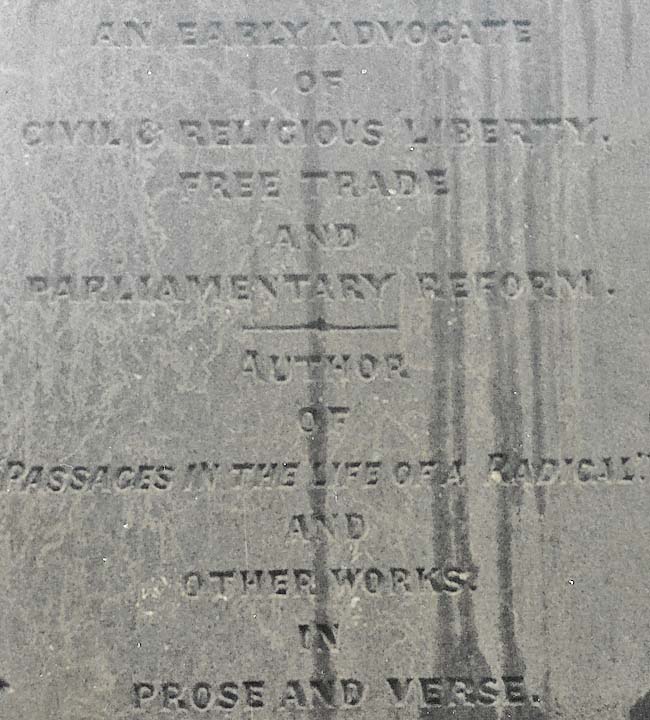
|
Close Window
